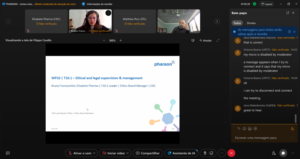Pharaon Project | Final Review Meeting with the EC | 20 February 2025
Caritas Coimbra participated in the Final Review Meeting of the Pharaon Project with the European Commission, where it presented the final results of the Portuguese Pilot and the progress in the ethics task, in which it was the leader.
🔹 Portuguese Pilot Results
Represented by Elisabete Pitarma, Caritas Coimbra and Santa Casa da Misericordia da Amadora, as pilot partners, highlighted the positive impacts of the tested services in reducing loneliness and improving the quality of life of older adults. The use of technologies such as Citizeen, Sentab, and Zensi promoted greater social connection, personal empowerment, and better digital usability, benefiting mainly older adults with low digital literacy and formal caregivers.
🚀 Implications for the Future
The project reinforced the importance of digital skills for older adults and caregivers, as well as the strategic integration of technology into services. Community acceptance of technology has proven essential in reducing loneliness and improving quality of life, highlighting the need for continuous training and structured strategic planning by organisations.
✨ The Portuguese Pilot demonstrated that community engagement and the use of technology can transform ageing in Portugal. 💡
🔹 Ethical Contribution
Bruna Franceschini presented Caritas Coimbra’s work in ethics, highlighting aspects such as ethical clarity, monitoring, and support activities for the various project pilots. Best practices were highlighted, including interdisciplinary ethical management, user-centred methods, participatory informed consent, and addressing inequalities. The experience reinforced the need for methodological flexibility, co-creation, and continuous learning for future ethical assessments.
For more information about the Pharaon Project, visit the project website at http://www.pharaon.eu (English) or the Caritas Coimbra website at https://lnkd.in/dBiHHWPp (Portuguese).
The Pharaon Project received funding from the European Union’s Horizon 2020 research and innovation programme under grant agreement No. 857188.

